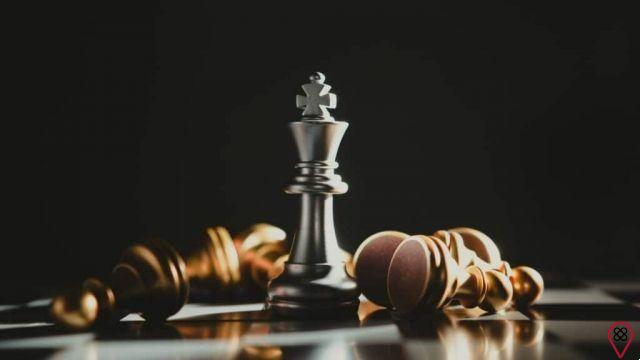Among those special friends that we feel as a gift that nature has reserved for us, to later convert them into brothers, I have one who, for a decade, has provided me with daily exchanges, as if the reason for this meeting had been precisely to enable the both a growth that we would never have, if we followed different trajectories.
To describe how much he contributed to my growth, the content obviously wouldn't fit in a text like this; therefore, I will limit myself to a small addition that I made to his development, which was to introduce him to the chess experience. Despite showing himself to be an expert in games of the most different types - to my surprise -, which made me discover that his visual impairment was nothing more than a mere detail, the first reaction was to tell me that he would hardly adapt to so many different movements between the pieces, and because of that, he was more comfortable playing checkers.

The argument, however, was far from enough to convince me, and I had more than reasonable reasons to lean on: just in that first year and a few months of daily contact, he amazed me at every moment with what he was revealing about his surprising intelligence: he was capable of beating many good people at electronic games attached to the TV (which he could not see) and he was making great strides in the use of the computer, on which I had installed a program by voice command. I soon discovered that, from everything I taught him, he expanded, many times over, the learning he received — to the point that, in a very short time, he already completely mastered the machine, even to participate in social networks, using only his innate talent.
It is then easier to understand my resistance to the counter-argument used for not playing chess. At that time, I was training him to share the teaching of the subjects I taught — one of them on Strategic Planning — such was the speed with which he absorbed the contents, and it was easy to see that he was a full-fledged strategist. What more consistent prerequisite than this to build a first-rate chess player, from the simple movement of the pieces?
Used to being surprised by him every day, with each new learning I provided him, it was no surprise when, in a few weeks, the creature surpassed its creator, and from that day - and through the years —, I took a sequence of “beatings” in chess that I had never imagined possible, driven by a “small” detail: I continued to depend on a board and its 32 pieces to play, and he didn't! Exactly what you are thinking: the prodigious mind of my “apprentice” allowed him, in just two weeks, to dispense with the board that I had given him as a gift to start playing chess from memory, as we played from a distance through the application of messages, using the parts notation.
However, the story of an unusual life partnership around chess was not only built on positive surprises: in the succession of games that took place day after day, something that surprised me was the growing enthusiasm of my chess partner, as he see winning all matches!

At this point in the narrative, it is necessary to open a parenthesis to say that, among the countless qualities of my friend-brother, the one that stood out to me the most — making us get so close — was his character. He personified a personal characteristic that I valued more than anything: that of nurturing respect and admiration for people of integrity, those with a character built on values and principles of unquestionable honesty. Because of this, I got used to separating human defects into just two categories: that of errors in the course, common to all mortals, and one related to character flaws — reason for not admitting, among my friends, any in who identified the second type.
Parenthesis closed, it is now possible for the reader to understand the feeling of anxiety that I was taken from a significant number of matches, which will precisely be the focus of our text: at this stage of the relationship, I already had a deep admiration for the person who he loved as a brother, and in whom he did not see a single objectionable trait in character. Imagine, then, if we begin to have doubts about our ability to analyze, when we perceive something that is not showing itself to be coherent with the previous evaluation... Would a simple game have the capacity to expose a fragility of our critical sense, which a long period of conviviality would have let go?
And, at this point, I resort to another pause, before moving on from the perspective of a chess player, in order to facilitate the reader's understanding. Chess brings a characteristic that distinguishes it from any other type of game, and that has been present since its origin: as something created by kings to make the not easy life of sovereigns less arduous, it sought to reproduce, in its rules, the the same values expected from royalty, from which attributes such as haughty posture, justice, nobility of character, loyalty and even respect for opponents are not lost, regardless of who they face and the din of battles.
It can be said that this foundation of a game (based on values) has not been lost until our days, and not only because of tradition, but as a differential in the disputes between sides that face each other. No one could imagine opponents of a chess game using shady means to win at any cost, like the cowboys of the old west, in a card game where anything goes to win, since the loss may not only be the money, but life itself. In many card games, even, resources such as the use of “trickery”, bluffing and cunning to deceive the opponent are an integral part of the rules, things absolutely opposite to what is expected of chess players, who don't even play for money, perhaps to not putting the greed of the players above the values expected of them.

Returning from history to reality, in a game where opponents are in remote locations - as is our case - it is natural that there is a time gap between a move made and its response by the partner, if they are not playing live. , it's not like this? This was the most common, until I noticed that, when I made a mistake, by moving a piece without analyzing the game as it should, the answer came faster than usual. Sometimes, even immediate, without giving me time to think better and redo the bid. As it was played at a distance, we had waived the official rule of “playing the piece is valid”, thus allowing a move to be reversed while the opponent did not respond. Something inside me, however, was uncomfortable when my partner, on these occasions, reacted immediately, when clearly it was impossible not to realize that the move was the result of a distraction and not of strategy, so unusual it was.
It would not be uncommon, therefore, for the feeling of discomfort to occur due to the relationship of trust already consolidated, proving to be incompatible with the entire history built. That kind of response, faster than usual, conveyed a message of opportunism over the opponent rather than a demonstration of strategic superiority, which is the basis of the game. It is this ability to intelligently set up attacks and defenses that enshrines the winner in chess, and not the victory achieved by cheating, as would be the case when taking advantage of a partner's distraction.
So imagine my conflict for not being able to understand how a person as honest as this spiritual brother of mine could have a disloyal attitude, to the point of taking advantage of my distraction to win the game. This, most assuredly, had nothing to do with the person I had such great respect for.
Of course, this bothered him, due to the inconsistency with the profile that I had admired from the beginning, until I discovered, some time later, my mistake: he had never been using disloyalty to take advantage of the game and win the game, just reasoning like a football player. checkers, which had been his most common pastime up until the time of his introduction to chess. I had taught him how to move the pieces, explained the main objective of the game - which was to protect the king - and the mandatory rules of the game.

But the logic of chess doesn't stop there, of course, because you don't win by the number of pieces left, as in the game of checkers. I had not realized that my novice opponent had not had time to assimilate something that does not appear in the rules, but that makes up what we could call the “ethics” of chess: the main premise of this game of kings is that it is better to lose departure than our values as people, in the name of an alleged—and misguided—victory by cheating.
For those uninitiated in the art of chess, let it be said, in passing, that the experience was quite rich, and we could talk for hours about the learning it provided. The important thing, however, is to remember that a game is not always just what the rule says: the way it is played — more than what it says explicitly — can establish the border between what is valid and what is not valid, what is ethical and what is not. ethics, the right or wrong way to play it, and even how the opponents will perceive each other after the match.
You may also like
- Learn to master the game of life
- Get emotional with 5 must-see video games
- Analyze whether your learning will come through love or pain
As we have already concluded, a game is not always just a game or the way we place the pieces on the board, but an indication of how we position ourselves in relation to life and our values in relation to others, who may not even have such altruistic thoughts as we would like, but they still cling to premises compatible with a humanity worth experiencing.
























